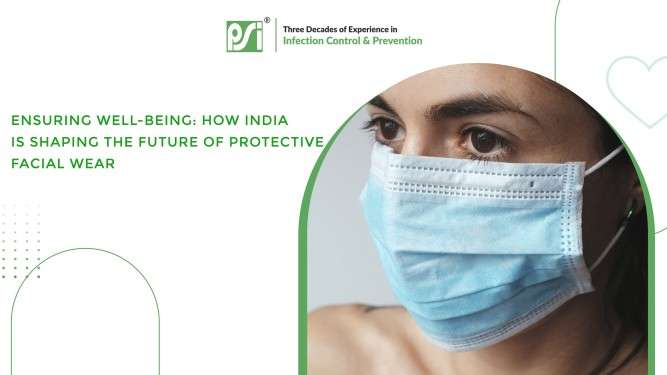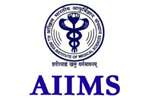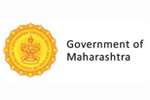One of the best Surgical Disposables company. I am dealing with them for the past 5 years,
their products are world-class. Their approach to trade is professional. All the best wishes to
them.
Ensuring Well-being: How India is Shaping the Future of Protective Facial Wear
- By: Plasti Surge Industries

India, renowned as one of the leading healthcare mask suppliers, has emerged as a pivotal player in the global market for protective facial wear. This significant role is largely attributed to the country's swift response to recent global health challenges, where the demand for high-quality protective gear skyrocketed. Indian manufacturers, leveraging their extensive textile and manufacturing expertise, rapidly scaled up production to meet not just domestic needs, but also the surging international demand. The agility and adaptability of Indian suppliers were crucial in stabilizing the global supply chain during critical times. Moreover, the Indian government's supportive policies and initiatives played a key role in this transition, helping the country to establish itself firmly on the global stage as a reliable and efficient healthcare mask supplier. This strategic positioning not only underlines India's capabilities in responding to health emergencies but also showcases its potential to lead in the global healthcare sector.
Historical Context
 The history of protective facial wear in India is a fascinating journey, intertwining traditional practices with modern advancements. Historically, the concept of face protection in India was rooted in basic cloth coverings, often used for protection against dust and pollution, rather than medical purposes. These traditional methods were more about practicality and accessibility rather than medical efficacy.
The history of protective facial wear in India is a fascinating journey, intertwining traditional practices with modern advancements. Historically, the concept of face protection in India was rooted in basic cloth coverings, often used for protection against dust and pollution, rather than medical purposes. These traditional methods were more about practicality and accessibility rather than medical efficacy.
The evolution into modern protective facial wear began with the global influence and the introduction of more sophisticated healthcare practices. This transformation was markedly accelerated by the entry of surgical mask manufacturers in India into the global market. These manufacturers adapted to the rising global standards for health and safety, especially in medical settings. The use of non-woven fabrics, which are more effective in filtering pathogens, became widespread.
The advent of the 21st century saw Indian manufacturers not only adopting but also innovating in the field of surgical masks. Leveraging India's strong textile industry, surgical mask manufacturers in India began integrating advanced materials and technologies. This included features like multiple layers for enhanced filtration, comfortable yet secure fittings, and hypoallergenic materials to reduce skin irritation.
These advancements were not just limited to materials and design. Indian manufacturers also incorporated automation and cutting-edge manufacturing techniques to increase production efficiency and maintain high quality standards. This transition from traditional cloth masks to high-quality surgical masks reflects India's journey in adapting and leading in the evolving landscape of protective facial wear.
Innovation and Technology
Medical mask makers in India have been at the forefront of several key innovations in the field of protective facial wear, significantly enhancing both effectiveness and comfort. These advancements span across various aspects of mask design, material, and technology.
- Advanced Filtration Materials: Indian manufacturers have innovated in using layered non-woven fabrics that offer higher filtration efficiency. These materials are adept at blocking microscopic particles, including bacteria and viruses, while still allowing for breathability.
- Ergonomic Designs: Recognizing the need for masks to be worn for extended periods, medical mask makers in India have focused on ergonomic designs. This includes contoured fits that adapt to different face shapes, adjustable nose clips for a secure fit, and elastic ear loops that reduce pressure.
- Antimicrobial Treatments: Some Indian manufacturers are applying antimicrobial treatments to their masks. These treatments can inhibit the growth of bacteria and viruses on the mask's surface, enhancing safety and longevity.
- Eco-Friendly Options: In response to environmental concerns, there's a growing trend among Indian mask makers to develop biodegradable and eco-friendly masks. These masks, made from plant-based materials or sustainable fabrics, aim to reduce environmental impact.
- Incorporation of Nanotechnology: Nanotechnology is being utilized to enhance filtration without compromising breathability. This involves embedding nanoparticles in the mask fabric that can effectively trap and neutralize pathogens.
- Smart Masks: A pioneering innovation from India includes the development of 'smart' masks, equipped with technology such as sensors to monitor air quality or detect mask wear and fit, enhancing the user's protection and experience.
- Comfort Enhancements: Recognizing the issues of skin irritation and discomfort with prolonged mask use, Indian manufacturers have developed masks with softer, hypoallergenic materials and moisture-wicking fabrics to enhance comfort.
These innovations by medical mask makers in India not only cater to the immediate need for effective protective gear but also reflect a commitment to ongoing research and development, ensuring that India remains at the cutting edge of advancements in protective facial wear.
Government Policies and Initiatives
The Indian government has played a pivotal role in promoting the production and innovation of protective facial wear, particularly supporting hospital face mask producers in India. This support has been critical in establishing India as a major player in the global market for high-quality medical masks. Several initiatives and policies have been implemented to bolster this sector:
- Financial Incentives and Subsidies: The government has introduced various subsidies and financial incentives for manufacturers. These measures are designed to lower production costs and encourage the establishment of new production units. This support has been particularly beneficial for small and medium-sized enterprises (SMEs) venturing into mask production.
- Regulatory Framework: The Indian government has established stringent regulations to ensure the quality and safety of face masks. These regulations mandate that hospital face mask producers in India adhere to specific standards in terms of material quality, design, and filtration efficacy. Such regulations ensure that the masks produced are safe for medical use and effective in preventing the spread of infections.
- Research and Development Grants: Recognizing the importance of innovation, the government has set up grants and funds to support research and development in protective facial wear. These grants are aimed at encouraging producers to explore new materials, technologies, and designs that can offer better protection and comfort.
- Export Promotion: To support hospital face mask producers in reaching global markets, the government has implemented policies to facilitate exports. These include streamlined processes, tax rebates, and participation in international trade fairs and exhibitions.
- Training and Skill Development Programs: Understanding the need for skilled labor in this sector, the government has initiated various training programs. These programs aim to equip workers with the necessary skills for high-quality mask production.
- Public-Private Partnerships: The government has fostered partnerships with private entities to enhance production capabilities. These collaborations have been instrumental in scaling up production to meet both national and international demand.
Through these measures, the Indian government has not only catalyzed the growth of hospital face mask producers in India but has also ensured that the masks produced are of the highest standard, contributing significantly to global health safety.
Collaborations and Partnerships
Operating room mask manufacturers in India have engaged in significant collaborations with international partners, leading to notable advancements in protective facial wear. These collaborations have been instrumental in combining India's manufacturing prowess with global technological and design expertise.
- Joint Ventures for Advanced Material Development: Indian manufacturers have partnered with international material science companies to develop advanced fabrics and filtration materials. These materials are specifically designed for operating room environments, offering higher protection levels against microbes and particulate matter.
- Technology Transfer Agreements: Some Indian companies have entered into technology transfer agreements with global leaders in protective wear. These agreements allow Indian manufacturers to access cutting-edge technologies, such as nanofiber filtration layers and antimicrobial coatings, enhancing the efficacy of the masks produced.
- Design and Ergonomics Collaboration: Recognizing the importance of comfort in operating room settings, Indian manufacturers have collaborated with international design firms. These collaborations focus on developing masks that are not only safe but also comfortable for long hours of wear, featuring better facial fit, reduced fogging for eyewear, and improved breathability.
- Collaborative Research and Development: Indian operating room mask manufacturers have joined forces with international research institutions and universities. These collaborations aim at conducting joint research on new materials, mask designs, and production techniques, pushing the boundaries of what's currently possible in mask technology.
- Supply Chain Integration: Collaborating with global logistics and supply chain experts has enabled Indian manufacturers to streamline their production and distribution processes. This ensures a steady supply of high-quality masks not just within India but across the globe.
- Cross-Border Regulatory Compliance: By working closely with international regulatory experts, Indian mask manufacturers ensure that their products meet the highest standards and comply with various international health and safety regulations. This is crucial for gaining access to and maintaining presence in global markets.
These collaborations underscore the commitment of operating room mask manufacturers in India to stay at the forefront of innovation in protective facial wear. By leveraging international expertise and resources, they have been able to enhance the quality, safety, and comfort of their products, catering to the evolving needs of the healthcare sector worldwide.
Impact on Public Health
The advancements made by healthcare mask suppliers in India have had a significant impact on public health within the country. While specific statistics and case studies may vary, the overall trends indicate a positive influence on both healthcare settings and the general population.
- Reduction in Healthcare-Associated Infections (HAIs): One of the most notable impacts has been the reduction in healthcare-associated infections. High-quality masks produced by Indian suppliers have improved the barrier protection for healthcare workers and patients, especially in high-risk environments like operating rooms and intensive care units. Although specific numbers may vary, reports from several hospitals indicate a noticeable decrease in HAIs since the adoption of these advanced masks.
- Improved Public Health During Pandemic Outbreaks: During recent pandemic outbreaks, the role of Indian healthcare mask suppliers has been crucial. By rapidly scaling up production and ensuring the availability of high-quality masks, they have helped mitigate the spread of infectious diseases. For instance, during the COVID-19 pandemic, regions with higher usage of these masks reported lower transmission rates, as suggested by various health departments.
- Enhanced Worker Safety in Industrial and Urban Settings: Beyond healthcare settings, these masks have also protected workers in industrial and highly polluted urban areas. Studies have shown a decrease in respiratory issues among workers in such environments, correlating with the increased use of high-quality protective masks.
- Case Studies of Successful Implementations: Specific case studies, such as those conducted in major hospitals or during public health campaigns, have illustrated the effectiveness of these masks. For example, a study in a leading Indian hospital showed a significant reduction in surgical site infections post-implementation of higher-grade masks supplied by Indian manufacturers.
- Widespread Public Awareness and Adoption: The initiatives by healthcare mask suppliers in India have also led to increased public awareness about respiratory health. This has translated into widespread adoption of masks in daily life, contributing to overall public health, especially in cities with high pollution levels.
- Impact on Seasonal Diseases: There has been a noted decrease in the incidence of seasonal diseases like flu and common colds, attributed in part to the increased use of protective masks in public spaces.
In summary, the contributions of healthcare mask suppliers in India have extended beyond the confines of hospitals, impacting various facets of public health. These developments have not only equipped the country to better handle health crises but also fostered a culture of health awareness and prevention.
Sustainability and Eco-friendliness
 Surgical mask manufacturers in India are increasingly integrating sustainable practices into their production processes, particularly focusing on biodegradable materials and recycling initiatives. This shift towards eco-friendliness reflects a growing awareness of environmental concerns and a commitment to reducing the ecological footprint of protective wear.
Surgical mask manufacturers in India are increasingly integrating sustainable practices into their production processes, particularly focusing on biodegradable materials and recycling initiatives. This shift towards eco-friendliness reflects a growing awareness of environmental concerns and a commitment to reducing the ecological footprint of protective wear.
- Use of Biodegradable Materials: A significant move by Indian manufacturers is the incorporation of biodegradable materials in mask production. These materials, derived from plant-based fibers or biopolymers, are designed to decompose naturally, thus reducing landfill waste. Some manufacturers have innovated with materials like bamboo, banana fiber, and even cornstarch-based polylactic acid (PLA), which offer both biodegradability and effective filtration.
- Recycling Initiatives: Recognizing the problem of disposable mask waste, surgical mask manufacturers in India have started recycling programs. These initiatives involve collecting used masks, sterilizing them, and repurposing the non-biodegradable components into other products like industrial raw materials or consumer goods.
- Eco-friendly Packaging: Alongside the masks themselves, attention is also being given to packaging. Manufacturers are replacing plastic and non-recyclable materials with recycled paper, biodegradable plastics, or even upcycled materials to package their products.
- Energy Efficiency in Production: Efforts are being made to reduce the environmental impact of the production process. This includes using renewable energy sources, implementing energy-efficient machinery, and optimizing production processes to minimize waste and reduce carbon emissions.
- Supply Chain Sustainability: Surgical mask manufacturers are also focusing on sustainability in their supply chains. This involves sourcing raw materials responsibly, minimizing transportation emissions, and working with suppliers who also adhere to environmental standards.
- Research and Development for Sustainable Solutions: There is a continuous investment in research and development to explore new sustainable materials and technologies. These efforts aim to improve the biodegradability and recyclability of masks without compromising on safety and effectiveness.
- Community Engagement and Awareness: Many manufacturers are engaging with communities and stakeholders to promote awareness about the environmental impact of disposable masks. They are also educating the public on proper disposal and recycling practices to ensure environmental sustainability.
Through these measures, surgical mask manufacturers in India are not only contributing to public health but also leading the way in sustainable manufacturing practices. By balancing the need for effective protective wear with environmental responsibility, they are setting a precedent for the global industry to follow.
Challenges and Opportunities
Hospital face mask producers in India, despite their significant role in the global market, face a range of challenges. These include intense competition, supply chain complexities, and technological barriers. However, each of these challenges also presents unique opportunities for growth and innovation.
- Intense Competition: The market for hospital face masks in India is highly competitive, with numerous domestic and international players. This competition can lead to price wars and reduced profit margins. However, it also drives innovation as manufacturers strive to differentiate their products through better quality, advanced features, or specialization in niche markets.
- Supply Chain Issues: Producers often encounter supply chain disruptions, including the availability of raw materials and logistical challenges. To turn this into an opportunity, manufacturers can invest in developing robust local supply chains, reducing dependence on imports. This can also spur the growth of ancillary industries within India, boosting the local economy.
- Technological Barriers: Access to the latest technologies in mask production can be a barrier, especially for smaller producers. This challenge can be transformed into an opportunity by investing in research and development. Collaboration with academic institutions and international partners can accelerate technological advancement and adoption.
- Quality Standards and Regulation Compliance: Meeting international quality standards and regulatory compliance can be challenging. However, adhering to these standards can open doors to global markets, enhancing the reputation of Indian manufacturers as producers of high-quality medical equipment.
- Cost of Innovation: The cost of developing new and improved masks can be high, but there is a significant opportunity in tapping into government grants, private investment, and public-private partnerships. These financial supports can ease the burden of innovation costs.
- Environmental Concerns: The environmental impact of disposable masks is a growing concern. Manufacturers can view this as an opportunity to innovate in eco-friendly and sustainable mask options, which could cater to a growing segment of environmentally conscious consumers.
- Market Diversification: Dependence on certain markets or sectors can be risky. Diversifying into different types of medical masks and protective wear for various industries (like pharmaceuticals, biotechnology, etc.) can spread risk and open new revenue streams.
By strategically addressing these challenges, hospital face mask producers in India can strengthen their market position, contribute to the country's economic growth, and continue to play a crucial role in global healthcare.
Future Trends and Predictions
Medical mask makers in India are poised at a pivotal juncture, with the industry expected to evolve rapidly in response to technological innovations, market growth, and emerging health needs. Here are some insights into the future trends in this sector:
- Technological Innovations: The future will likely see a surge in technological advancements in mask production. This includes the development of smart masks equipped with sensors to monitor air quality and breathing patterns, and the use of nanotechnology for enhanced filtration without compromising breathability. Indian manufacturers are expected to invest heavily in these areas to stay competitive and meet evolving consumer demands.
- Sustainable and Eco-friendly Products: As environmental concerns gain prominence, there will be a significant shift towards sustainable and biodegradable masks. Medical mask makers in India are expected to innovate with eco-friendly materials like plant-based fibers, reducing the environmental impact of disposable masks.
- Customization and Personalization: Customized masks tailored to individual facial structures and specific health conditions (like asthma or allergies) are likely to become more prevalent. This personalization could extend to design elements, catering to consumers seeking a blend of style and functionality.
- Expansion into New Markets: With the growing awareness of health and safety, the demand for medical masks is expected to rise not just in healthcare settings but also in industries like construction, mining, and chemical processing. This opens new market opportunities for Indian manufacturers.
- Integration with Wearable Technology: The integration of masks with other wearable health technology devices could be a significant trend. For instance, masks that can sync with fitness trackers or health monitoring apps to provide users with comprehensive health data.
- Increased Research and Development: There will likely be more investment in R&D to continually improve mask efficacy, comfort, and safety. Collaborations with universities and research institutions will be key in driving these innovations.
- Government Policies and Global Standards: Medical mask makers in India will need to adapt to changing government policies and international health standards. This includes compliance with global health directives and adapting to export market requirements.
- Rise in Health Awareness: Post-pandemic, the general public's awareness and understanding of respiratory health have increased. This trend is expected to continue, leading to sustained demand for high-quality masks.
These trends indicate a dynamic future for medical mask makers in India, characterized by innovation, expansion, and a strong focus on sustainability and public health.
Conclusion
Operating room mask manufacturers in India have significantly marked their presence in the global protective facial wear industry. Their journey, characterized by innovation, resilience, and quality, has positioned India as a key player in this crucial sector. Embracing state-of-the-art technologies and materials, these manufacturers have developed masks that meet the highest standards of safety and comfort, essential for operating room environments. This commitment to quality is bolstered by the Indian government's supportive policies, including subsidies, grants, and stringent regulatory frameworks, ensuring that the products meet international safety standards.
The collaboration between Indian manufacturers and global partners has been a cornerstone of this success, leading to technological exchanges and market expansion. These partnerships have enabled Indian companies to access cutting-edge technologies and broaden their global footprint. Furthermore, the industry's focus on sustainability, with initiatives for eco-friendly and biodegradable mask options, reflects a forward-thinking approach, aligning with global environmental concerns.
India's role in the protective facial wear sector goes beyond manufacturing; it's about setting benchmarks in quality, innovation, and sustainability. For those seeking reliable, high-quality protective solutions, Indian operating room mask manufacturers stand out as a premier choice. Discover more about the excellence and range of products at PsiDispo, and take a step towards ensuring the highest standards of safety and efficacy in healthcare environments. Explore the possibilities and join the movement towards better protective healthcare solutions.
One of the best companies to partner with. Very responsive and best product quality.
Good experience and corporation for many years. Timely services are provided.
We have been associated with PSI since more than 20 years now. They have superior products, prompt service & courteous people. Using PSI’s products in turn makes our customer happy and helps us to do more business. Overall truly delighted with their customer service.














_iCEz.jpeg)
 +91-7798800781
+91-7798800781

m8zd.jpg)




